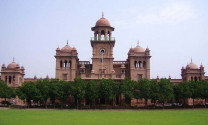Decency is never inappropriate
If we believe in a humane order, we cannot achieve that goal through inhuman means.

The story of Darkness at Noon is that of Rubashov, a revolutionary communist, now himself imprisoned on charges of treason. As Rubashov rots in jail, he thinks about all the people he betrayed in order to further the cause he then believed in — even his own mistress. He tries to convince his torturers of his innocence, but to no avail. Eventually, he realises that his fealty to the Cause requires him to confess, even though he is innocent. He does so and is then executed.
In the Cliff Notes version of the book that remains seared into my brain, the moral of the story was as follows: The ends do not justify the means. Corrupt means will eventually only produce corrupt ends.
I mention all of this because of Ejaz Haider’s recent column on “Emergency Ethics.” So far as I understand it Ejaz’s argument is that this is not a time when we have the luxury of respecting the full panoply of human rights. Instead, he gave the example of Peru’s war against the Shining Path guerillas, as well as Britain’s decision to bomb German cities and civilians, as ways in which states have overcome mortal threats to their existence. We must, he concludes, “put a moratorium on our decency because that is the only way to ensure [our] survival in the long term.”
It is by now, fairly evident, that we live in troubled times. The murder of Salmaan Taseer was followed by a storm of outrage and then a slow fade into indifference. The murder of Shahbaz Bhatti has accelerated that process so that we went from shock to indifference in a few hours (as opposed to a few months). Can there be any doubt that this country is locked in a mortal struggle for its very soul? Do we really have the luxury of being decent to our opponents?
My answer is that we have no option but to be decent. We are fighting, not just for our lives, but for our ideals. If we believe in a humane order, we cannot achieve that goal through inhuman means.
The irony about this conversation is that we have just witnessed a terrible war in which the gung-ho approach has been tried and failed. Have we already forgotten what happened in Abu Ghraib, as well as the delight we all took in condemning the United States for its hypocrisy? What was Abu Ghraib except the institutionalisation of indecency?
Leaving aside the euphemisms, what exactly are we talking about here? Does Ejaz want our police to have the legal authority to torture suspects? Does he want the armed forces to have the power to carpet-bomb North Waziristan? Does he want the state to have the power to detain people indefinitely?
I ask these questions not to be unhelpful or condescending. The soldiers dying out there in the tribal areas are dying to keep my mushy liberal backside safe and it does not behoove me — or anybody else — to be flippant. And I am not. Instead, the argument I am making is that we are fighting, not just for physical survival, but for a set of values. Those values do not include torture and they do not include crimes against humanity. And I, for one, am willing to live with the consequences.
At the end of the day, I believe in this country, not as a gift from God, but as a creation of a compact between its peoples, an agreement to live and die by certain rules. Unlike Americans, I do not have the luxury of idealising the framers of my constitution. (Anybody so inclined should read those parts of the constitutional debates where Mian Mehmood Ali Kasuri is repeatedly interrupted by cries of “oye motay!”) Nonetheless, there is a fundamental wisdom distilled into this document, none more so than Article 233, which provides that certain fundamental rights can be suspended during an emergency, but not all. The rights which cannot be suspended include the right of habeas corpus (Art. 10) and the right not to be tortured (Art. 14). In other words, our most fundamental agreement provides that no matter what happens, we cannot and will not give up certain basic human dignities.
Let me put this argument a different way: every time we are confronted by a fresh outrage, this nation turns and asks itself, what kind of people could do such sick things? What kind of people can use a 15-year-old boy as a bomb? What kind of people would bomb a mosque full of worshippers? What kind of people would kill a person just because of his faith? Do we really want the answer to be “people like us”?
One of the few heartening things that came out last year was the yeh hum naheen movement. That simple statement — this is not us — meant a great deal to me. It showed me that there is a core gentleness in our character which rejects the violence and the hate being inflicted upon us in the name of our religion. Yes, I have heard all the cynical analyses, that Pakistan is an unfortunate mistake composed of nothing but the mongrel remnants of the subcontinent, that there is no ‘nation’ in any coherent sense of that term. My answer to that is very simple: We may not have been much of a nation in 1947 but we sure as hell are becoming one now.
To return to Ejaz’s suggestion, the purpose of this column is not to sneer at him. He is not only one of my dearest friends but also one of the most deeply learned people I know. But in this case, he is completely and utterly wrong. Decency is never inappropriate. Yeh hum naheen.
Published in The Express Tribune, March 6th, 2011.



















COMMENTS
Comments are moderated and generally will be posted if they are on-topic and not abusive.
For more information, please see our Comments FAQ